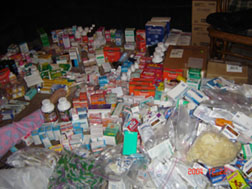About CODEPINK
CODEPINK is a women-initiated grassroots peace and social justice movement working to end U.S. funded wars and occupations, to challenge militarism globally, and to redirect our resources into health care, education, green jobs and other life-affirming activities. The name CODEPINK satirized the Bush Administration's color-coded, fear-mongering "security" alert system that has since been phased out. CODEPINK is a lively call for the people of the world to "wage peace." More...
CODEPINK © 2003-2014








